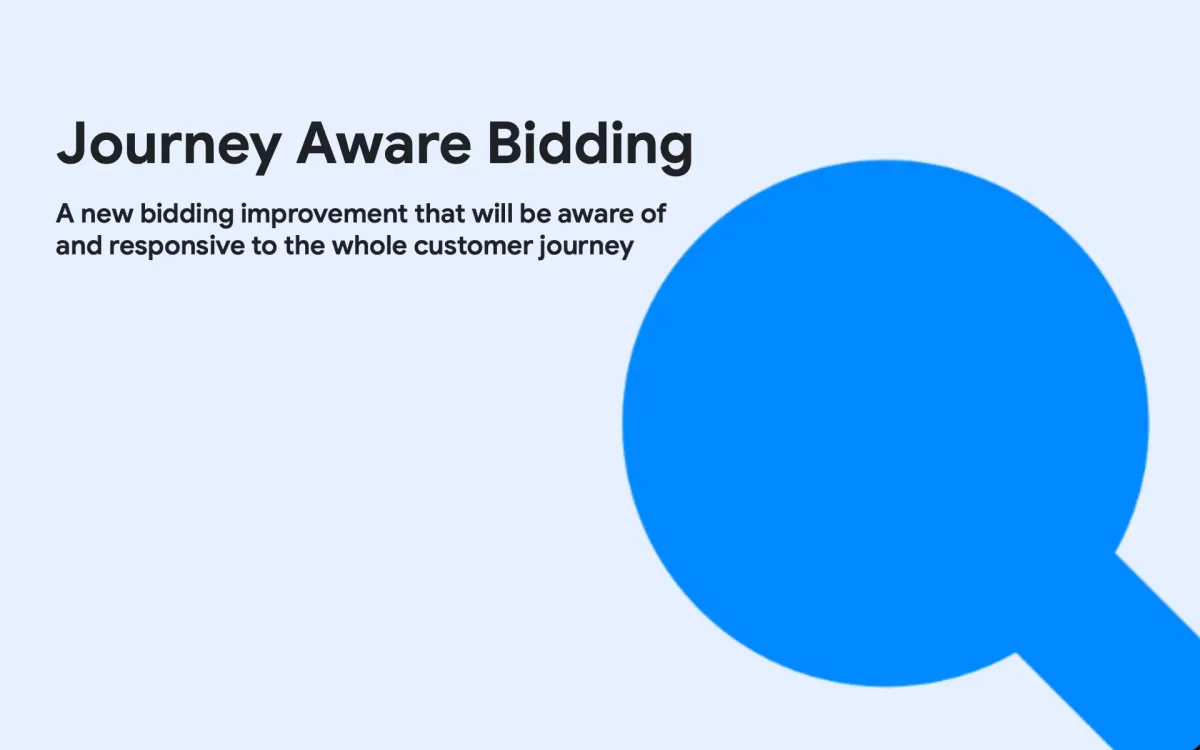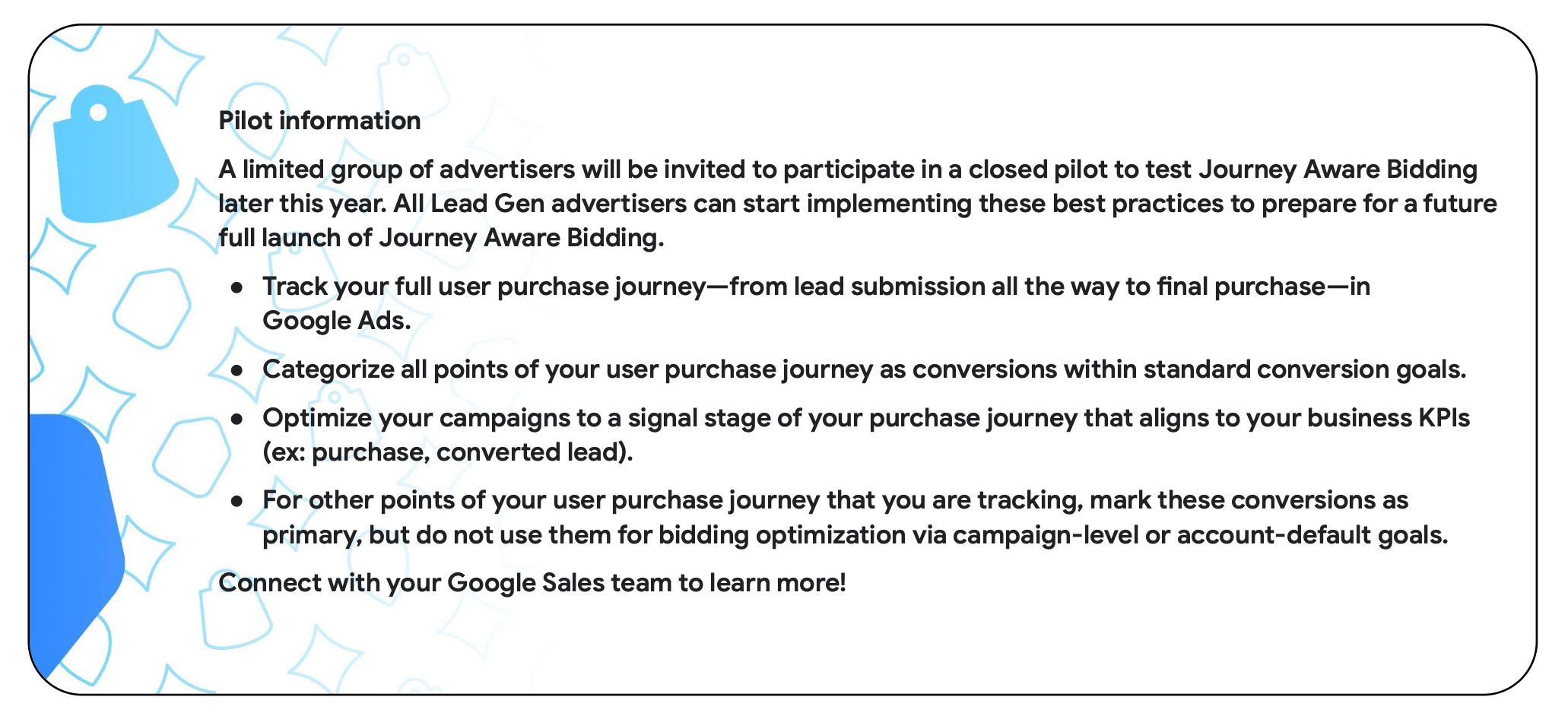
Google Ads this month has published a document announcing Journey Aware Bidding. This new bidding technology learns from both biddable and non-biddable signals across the entire customer journey, not just final conversion events. The feature will target lead generation businesses initially, with pilot testing scheduled for later this year.
Journey Aware Bidding represents a significant shift from traditional bidding strategies that optimize primarily for end-of-funnel conversions. According to the documentation, the system "learns from your biddable conversion goal in addition to other, non-biddable goals along the user journey in order to improve predictions and overall performance."
Subscribe PPC Land newsletter ✉️ for similar stories like this one. Receive the news every day in your inbox. Free of ads. 10 USD per year.
"Too many campaigns optimize for shallow conversions," noted Georgi Zayakov, Senior Consultant Digital Advertising at Hutter Consult AG, in his LinkedIn analysis of the announcement. "Journey-aware bidding could force a mindset shift toward quality. Optimizing across the whole journey could finally push advertisers to focus on real outcomes instead of vanity metrics."
The announcement comes at a time when Google has been pushing advertisers toward more sophisticated automated bidding solutions. The company has systematically deprecated manual bidding features like bid multipliers in Display & Video 360 while promoting machine learning-driven alternatives.
Data infrastructure requirements
The success of Journey Aware Bidding depends heavily on comprehensive data collection infrastructure. Google has been preparing advertisers for this shift through complementary measurement tools launched throughout 2025.
Google Tag Gateway for advertisers, launched in May 2025, directly supports journey optimization by improving data accuracy across touchpoints. The system routes tracking data through advertisers' own servers rather than third-party domains, resulting in an 11% improvement in signal collection. This enhanced data quality becomes crucial for Journey Aware Bidding's machine learning algorithms.
"Advertisers who configured Google tag gateway saw an 11% uplift in signals," according to Google's internal data. This improvement stems from first-party data collection that circumvents ad blockers and browser restrictions affecting traditional tracking methods.
Data Manager represents another critical component of the journey optimization ecosystem. The platform consolidates first-party data from multiple sources including CRM systems, websites, and mobile applications. Journey Aware Bidding requires this unified customer view to understand interactions across all touchpoints effectively.
The integration reflects Google's broader strategy of moving advertisers toward first-party data infrastructure. Without comprehensive tracking across the entire customer journey, the new bidding system cannot distinguish between high-value and low-value user paths, limiting optimization effectiveness.
Buy ads on PPC Land. PPC Land has standard and native ad formats via major DSPs and ad platforms like Google Ads. Via an auction CPM, you can reach industry professionals.
Industry context and market implications
The announcement aligns with broader industry trends toward more sophisticated optimization systems. Amazon introduced Conversion Path Reporting in January 2025, providing advertisers with detailed insights into customer journeys across multiple touchpoints. This parallel development suggests the digital advertising industry is collectively moving toward holistic journey optimization.
Recent research by Google and Yale University on ad auction mechanisms supports this direction. The study, published in May 2024, examined how auction systems could evolve from simple cost-per-click bidding to user lifetime value optimization. Journey Aware Bidding appears to implement some of these theoretical concepts in a practical advertising product.
The focus on lead generation businesses reflects Google's recognition that B2B marketers face unique challenges in campaign optimization. Lead generation companies typically manage longer sales cycles with multiple decision-makers, making traditional conversion-based bidding less effective.
Technical implementation details
The bidding system works by analyzing multiple conversion stages throughout the customer acquisition process. Traditional bidding strategies typically focus on a single conversion event, such as a purchase or lead submission. Journey Aware Bidding expands this approach to consider preliminary interactions like form views, email subscriptions, and content downloads.
"Customers who report all relevant journey stages and categorize them correctly will benefit from Journey Aware Bidding," states the documentation. This requirement suggests advertisers must implement comprehensive conversion tracking across their entire funnel to access the feature's full capabilities.
The system operates within Search campaigns and utilizes Google's existing Smart Bidding infrastructure. However, unlike standard automated bidding strategies that require 15-30 conversions per month for optimal performance, Journey Aware Bidding can learn from both counted conversions and non-counted user interactions.

Pilot program and availability
Google plans to invite a limited group of advertisers to participate in closed pilot testing later this year. The company has established specific preparation requirements for potential participants, including comprehensive funnel tracking implementation and proper conversion categorization.
"All Lead Gen advertisers can start implementing these best practices to prepare for a future full launch of Journey Aware Bidding," according to the documentation. The preparation guidelines include tracking the complete user purchase journey from lead submission to final purchase, categorizing all journey points as conversions within standard conversion goals, and optimizing campaigns to funnel stages that align with business KPIs.
The pilot program approach mirrors Google's typical product launch strategy for advanced features. Previous automated bidding enhancements, including Target CPA and Maximize Conversions, followed similar limited testing phases before general availability.
Marketing community implications
Zayakov's analysis highlights the broader implications for digital marketing practices. He observes that "Most advertisers still optimize for the fastest signal possible," noting that "Journey-aware bidding could force a mindset shift toward quality" rather than simply pursuing quick conversions that may not translate to genuine business value.
The feature addresses a fundamental challenge in lead generation marketing where businesses must balance upper-funnel engagement with lower-funnel conversions. Traditional bidding strategies force advertisers to choose optimization targets, potentially missing valuable micro-interactions that contribute to eventual conversions.
Digital marketing professionals have expressed cautious optimism about the feature's potential impact, though implementation complexity remains a concern. The requirement for comprehensive funnel tracking and proper conversion categorization may challenge smaller businesses or those with limited technical resources.
The announcement follows Google's broader strategy of integrating artificial intelligence across its advertising platform. Recent developments include AI Max for Search campaigns and enhanced automation features in Display & Video 360, all designed to reduce manual campaign management requirements.
Preparation requirements and timeline
Organizations interested in participating in the pilot program should begin implementing the recommended tracking infrastructure immediately. The preparation process involves several technical requirements that may take months to complete properly.
Key preparation steps include establishing comprehensive conversion tracking across all customer touchpoints, implementing proper goal categorization within Google Ads conversion settings, and ensuring sufficient conversion volume for machine learning optimization. The documentation emphasizes that conversion tracking must extend beyond lead submission to include final purchase events for optimal system performance.
Google has not announced specific dates for pilot program applications or general availability. The "later this year" timeline suggests testing could begin in the second half of 2025, with broader rollout potentially extending into 2026 based on pilot results.
Journey Aware Bidding represents Google's most sophisticated approach to campaign optimization, potentially addressing fundamental limitations in current bidding strategies. The focus on complete customer journeys rather than individual conversion events could significantly improve campaign performance for businesses with complex sales funnels. However, successful implementation will require substantial technical preparation and comprehensive tracking infrastructure that may challenge smaller advertisers.
Subscribe PPC Land newsletter ✉️ for similar stories like this one. Receive the news every day in your inbox. Free of ads. 10 USD per year.
Timeline
- September, 2025 - Google announces Journey Aware Bidding at Think Week 2025 for lead generation campaigns
- May 2024 - Google Research and Yale University publish framework for ad auction optimization beyond simple CPC bidding
- May 2025 - Google introduces tag gateway to improve ad tracking accuracy enabling 11% signal uplift through first-party data collection
- August 2024 - Google releases value-based bidding optimization guide for lead generation campaigns
- January 2025 - Amazon introduces Conversion Path Reporting to track 30-day customer journeys
- April 2025 - Google removes bid multipliers from DV360, pushing advertisers toward automated bidding solutions
- June 2025 - Google clarifies value-based bidding requirements for Demand Gen campaigns
- August 2025 - Google Ads API v21 introduces AI Max for enhanced Search campaign automation
- Later 2025 - Journey Aware Bidding closed pilot testing scheduled to begin
Related Coverage
- Google introduces tag gateway to improve ad tracking accuracy - First-party data infrastructure enabling comprehensive journey tracking
- Google unveils server-side tagging and enhanced app measurement tools - Enhanced measurement capabilities for cross-device attribution
- French agency achieves 7% cost efficiency boost with attention-based bidding - Advanced bidding strategies in DV360
- DV360 reports 60% cost reduction with AI-enhanced automation - Machine learning performance improvements
- Google research shows ad auction model shift from CPC to user lifetime value - Theoretical foundation for journey optimization
- Google introduces auction-time bidding in Search Ads 360 - Earlier machine learning bidding advancement
Summary
Who: Google Ads targeting lead generation businesses and advertisers with complex customer journeys
What: Journey Aware Bidding technology that optimizes across entire customer journeys using both biddable and non-biddable conversion signals, moving beyond traditional end-of-funnel optimization
When: Announced September 2025 at Think Week 2025; closed pilot testing scheduled for later in 2025
Where: Available in Google Ads Search campaigns for qualified advertisers who meet comprehensive tracking requirements
Why: Traditional bidding strategies focus only on final conversions, missing optimization opportunities across the full customer journey. This creates suboptimal performance for businesses with complex, multi-stage sales processes typical in lead generation industries

